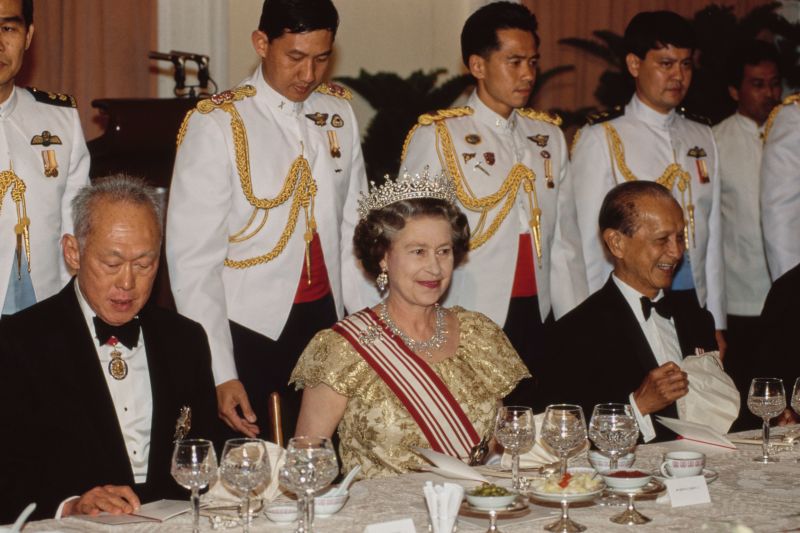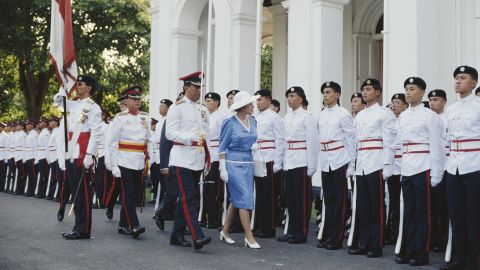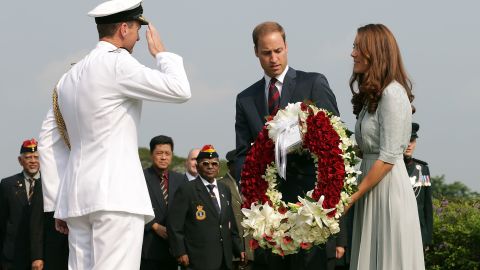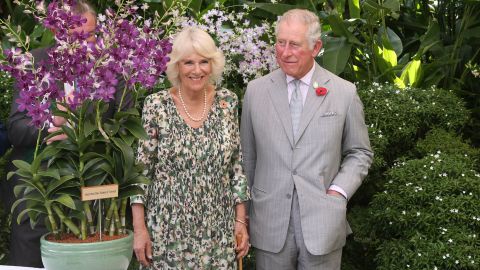
CNN
—
It has been close to six decades since the British monarchy symbolically ruled Singapore, but Queen Elizabeth II’s death still elicited grief and reflection in the Southeast Asian nation.
Leading tributes was Singapore’s Prime Minister Lee Hsien Loong, who sent his condolences to British leaders and shared a photograph taken with the Queen back in 2018. “Her Majesty was the very heart and soul of the United Kingdom,” Lee wrote in an accompanying post shared on Facebook. “Her Majesty also left a significant mark on Singapore’s history and our longstanding close relations with the United Kingdom.”
“Her passing is greatly mourned by everyone in Singapore,” he added.
Lee’s ministers and other high ranking members of his ruling party cabinet, including political successor Lawrence Wong, swiftly followed suit – paying tribute to the late Queen by sharing condolence letters and recounting past meetings with her during official visits both at home and abroad.
Singapore’s reaction to the Queen’s death this month at the age of 96 puts it in line with the wave of sadness expressed online and in many countries around the world – but is at odds with some other former colonies where the reaction has been more complex.
In India, where many view the monarchy as a symbol of colonial-era oppression, some have called for the return of the Koh-i-Noor diamond; in parts of Africa, many are refusing to mourn; while some Caribbean nations have suggested they will consider removing the Queen’s son – now King Charles III – as head of state within the next few years.
Experts say the reason for the difference is because Singapore – ruled by Britain for 144 years until 1963 when it became part of Malaysia and then fully independent in 1965 – emerged relatively unscathed from colonial rule compared to some other former colonies.
Indeed, its politicians have given measured praise to Britain over the years for setting up a legal system that contributed to the modern-day prosperity of the city-state, now a thriving sovereign country that is among the world’s richest on a per capita basis and has its own head of state.
Parliament on Monday observed one minute of silence out of respect to the late Queen. “Her late Majesty was not only Queen of the United Kingdom but also the head of the Commonwealth, a family of 56 nations across the globe of which Singapore is a proud member,” said Leader of the House Indranee Rajah.
“Beyond the formality and ceremonials involved in state visits, the Queen took the time and effort to get to know ordinary Singaporeans better,” she said.
And on September 19, the day of her funeral, state flags at government buildings will be flown at half mast – under the instruction of Prime Minister Lee.

In Singapore, roads, neighborhoods and prestigious institutions like government buildings and hospitals still bear the names of British lords and various military commanders.
Queenstown, a bustling central neighborhood, the Queen Elizabeth promenade Walk and even Princess Elizabeth Primary School were named after Elizabeth II to commemorate her coronation in 1953.
In 2019, Singapore held large scale bicentennial celebrations with festivals and events marking the 200th anniversary of the arrival of British statesman Sir Stamford Raffles and the British East India Company arriving on its shores.
“Singaporeans, especially from the ruling elite, tend to have a rather benign view of Great Britain and its monarchy,” noted political scientist Ian Chong from the National University of Singapore, who recalled public fervor around visits from royals throughout the years.
A 2012 visit by Prince William and his wife Catherine as part of their Diamond Jubilee tour of Southeast Asia and the South Pacific drew large crowds across the island.
The Queen herself was hosted on three occasions: in 1972, 1989 and 2006. As part of Singapore’s diplomatic charm offensive, it named a cultivated orchid hybrid after her – bred from orchids originating from Singapore and Papua New Guinea.
“Broadly, views of Queen Elizabeth II and the British Royal Family are positive in Singapore,” Chong said.
“Some of this is unsurprising given that our departure from British colonial rule was a negotiated one, which contrasted with states that saw widespread repression and more violent ends to colonial rule.”

But there were darker sides to British rule in Singapore, too. Experts point out the colonial administration suppressed the local identity and made English the official language. They also say modern Singapore’s infamous tough stance towards hard drugs was a result of colonial Britain’s lucrative opium trade.
“The official narrative deliberately romanticizes (colonialism) for political reasons while suppressing other perspectives,” said exiled journalist and historian Thum Ping Tjin, also a visiting fellow at Oxford’s Hertford College. Like other critics, Thum has questioned the admiration Singapore’s leaders have sometimes expressed for their colonial founders and the erasure of anti-colonial activism.
“Singapore continues to be governed using the same values, institutions and assumptions that underpinned British colonialism so the government cannot reject or repudiate colonialism without also criticizing its own values, institutions and methods of governance,” Thum said.
The empire’s complex legacy was evident in various controversial colonial era laws that remained in effect in Singapore even following independence. The Criminal Law (Temporary Provisions) Act allowed for detaining people without trial and Section 377A criminalized homosexuality until it was recently announced that it would be repealed following decades of opposition.
“In many respects, independent Singapore is an inheritor of British colonial rules which we have adapted – we see this in everything from government housing schemes, policies and specific laws,” said Chong the political scientist.
“Our politicians often point to the colonial system of laws and courts as benefiting our prosperity and stability. So colonial rule is generally seen as benign and a foundation of Singapore’s wealth. Hence the celebratory air surrounding (events such as) the bicentennial celebrations back in 2019.”
Following his mother’s death, Charles ascended the throne to become the new King – making him the head of state for 14 countries (in addition to the UK).
But several of those countries – which include Antigua and Barbuda, Jamaica and Belize – are openly considering severing their links with the British monarchy, and some have suggested the Queen’s death could be a catalyst for this move.
In November, Barbados – Britain’s oldest colony – removed the Queen as its head of state and declared itself a republic.
But in Singapore, a republic that appoints a president – currently Halimah Yacob – as its own ceremonial head of state, Charles seems relatively popular.
When he was still prince, Charles was a familiar public figure to many Singaporeans. In 2017, he received the same Singaporean honor as the Queen and other dignitaries of having an orchid – the national flower – named after him and his wife Camilla, now the Queen Consort.
“A gift fit for a (future) king and perhaps one well earned after a grueling and packed program,” wrote state media outlets.

Experts now expect growing interest and curiosity from Singaporeans surrounding England’s new monarch.
Memes of Charles among younger Singaporeans have already sprung up on popular local discussion boards, suggesting the Royal Family’s legacy, for the moment at least, remains intact.
